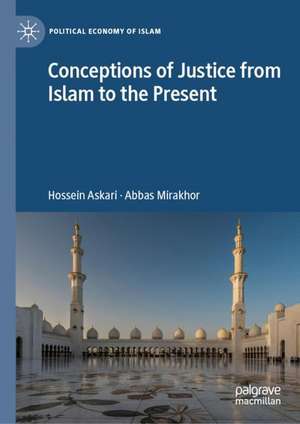Conceptions of Justice from Islam to the Present: Political Economy of Islam
Autor Hossein Askari, Abbas Mirakhoren Limba Engleză Hardback – 8 mai 2019
Preț: 536.31 lei
Preț vechi: 630.96 lei
-15% Nou
Puncte Express: 804
Preț estimativ în valută:
102.62€ • 107.42$ • 85.41£
102.62€ • 107.42$ • 85.41£
Carte tipărită la comandă
Livrare economică 31 martie-14 aprilie
Preluare comenzi: 021 569.72.76
Specificații
ISBN-13: 9783030160838
ISBN-10: 3030160831
Pagini: 306
Ilustrații: XXI, 292 p. 6 illus., 5 illus. in color.
Dimensiuni: 148 x 210 mm
Greutate: 0.66 kg
Ediția:1st ed. 2020
Editura: Springer International Publishing
Colecția Palgrave Macmillan
Seria Political Economy of Islam
Locul publicării:Cham, Switzerland
ISBN-10: 3030160831
Pagini: 306
Ilustrații: XXI, 292 p. 6 illus., 5 illus. in color.
Dimensiuni: 148 x 210 mm
Greutate: 0.66 kg
Ediția:1st ed. 2020
Editura: Springer International Publishing
Colecția Palgrave Macmillan
Seria Political Economy of Islam
Locul publicării:Cham, Switzerland
Cuprins
1. Chapter 1: Introduction and Summary of the Conception of Justice in Islam.- 2. Chapter 2: Contemporary Muslim Scholars and Philosophers on Justice in Islam.- 3. Chapter 3: Conception of Justice in the Age of Enlightenment.- 4. Chapter 4: The Utilitarian Conception of Justice and its Critics (Bentham to Hayek).- 5. Chapter 5: Conception of Justice from Rawls to Sen to the Present.- 6. Chapter 6: The State of Justice and Impediments to a More Just Muslim World.- 7. Chapter 7: Concluding Remarks
Notă biografică
Hossein Askari is former Assistant Professor at Tufts University, Professor of Business and Middle East Studies at the University of Texas at Austin. Previously, he was the Iran Professor of Business and International Affairs at The George Washington University, becoming Emeritus in 2019.
Abbas Mirakhor is former Executive Director and Dean of the Executive Board of the International Monetary Fund. Previously, he taught at universities in Iran and in the US and was the First Holder of the INCEIF Chair in Islamic Finance at INCEIF in Malaysia.Textul de pe ultima copertă
This book explains a perspective on the system of justice that emerges in Islam if rules are followed and how the Islamic system is differentiated from the conventional thinking on justice. It examines conceptions of justice from the Enlightenment to Bentham to Rawls to contemporary philosophers including Sen, Cohen, Nussbaum, and Pogge. The authors present the views of twentieth century Muslim thinkers on justice who see Muslims upholding rituals but not living according to Qur’anic rules. It provides empirical surveys of the current state of justice in Muslim countries analyzing the economic, social, and political state of affairs. The authors conclude by assessing the state of justice-injustice in Muslim countries and highlighting areas in need of attention for justice to prevail.
Hossein Askari is former Assistant Professor at Tufts University, Professor of Business and Middle East Studies at the University of Texas at Austin. Previously, he was the Iran Professor of Business and International Affairs at The George Washington University, becoming Emeritus in 2019.
Hossein Askari is former Assistant Professor at Tufts University, Professor of Business and Middle East Studies at the University of Texas at Austin. Previously, he was the Iran Professor of Business and International Affairs at The George Washington University, becoming Emeritus in 2019.
Abbas Mirakhor is former Executive Director and Dean of the Executive Board of the International Monetary Fund. Previously, he taught at universities in Iran and in the US and was the First Holder of the INCEIF Chair in Islamic Finance at INCEIF in Malaysia.
Caracteristici
Compares and contrasts the major theories of justice to the teachings of Islam and its system of justice Presents a comprehensive description of justice in Islam—justice as a system that emerges if rulers and members of the community are rule compliant Analyzes contemporary conceptions of justice from Utilitarianism to Rawls’ A Theory of Justice and Sen’s The Idea of Justice and their prominent critics












